Term Page
Detention 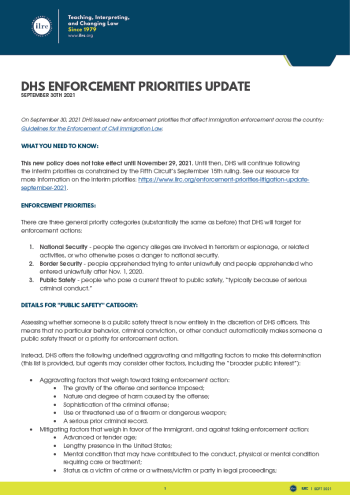
A quick digest of the new DHS immigration enforcement priorities released in September 2021.
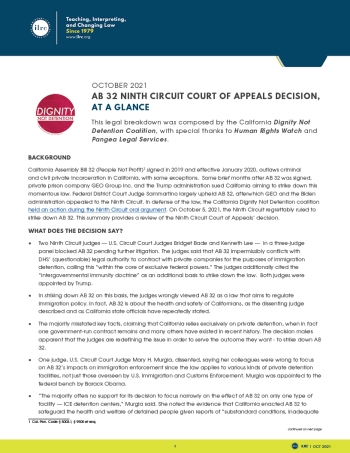
AB 32 (People Not Profit) signed in 2019 and effective January 2020, outlaws criminal and civil private incarceration in California, with some exceptions. Some brief months after AB 32 was signed, private prison company GEO Group Inc. and the Trump administration sued California aiming to strike down this momentous law. Federal District Court Judge Sammartino largely upheld AB 32, afterwhich GEO and the Biden administration appealed to the Ninth Circuit.
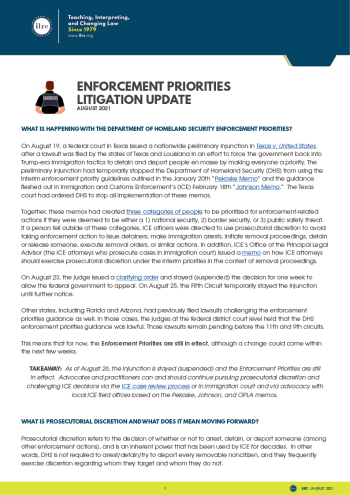
There have been many recent developments regarding the litigation challenges to the Department of Homeland Security enforcement priorities. This brief guide provides a quick summary to help you keep up. In short, the Enforcement Priorities are currently still in effect, although a change could come within the next few weeks. Below you will additionally find the Fifth Circuit’s temporary stay of the lower federal district court’s preliminary injunction order. While these issues are quickly moving, this update is current as of September 2021.
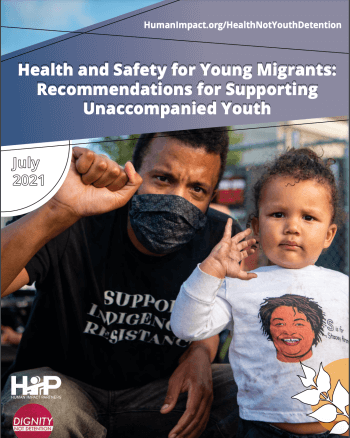
This resource, written by Human Impact Partners in collaboration with the ILRC and others as part of the Dignity Not Detention Coalition, outlines recommendations for what healthy, just, and supportive immigration policy can look like for unaccompanied youth immigrating to the US, without relying on detention or detention-like facilities. Rooted in the stories, experiences, and recommendations of young people who arrived in the US as unaccompanied youth, this resource draws from public health evidence documenting the health harms of detention in large-scale, restrictive settings. It puts forward a vision for ending the current system of detaining unaccompanied minors in harmful settings and for shaping healthy, just, and supportive immigration policy for unaccompanied youth. You can also check this resource for more important information from Human Impact Partners.

ICE enforcement priorities have changed under the Biden administration, signaling a return to the use of prosecutorial discretion. On May 27, 2021, the ICE Principal Legal Advisor issued guidance for OPLA attorneys about how and when to exercise prosecutorial discretion during various stages of removal proceedings. EOIR subsequently issued its own memo discussing EOIR policies related to the enforcement priorities. Building upon our previous practice advisory, Advocating for Clients under the Biden Administration’s Interim Enforcement Priorities, this practice alert from ILRC and NIPNLG provides immigration practitioners with a summary of the OPLA and EOIR guidance, including key information, practice tips, and takeaways.
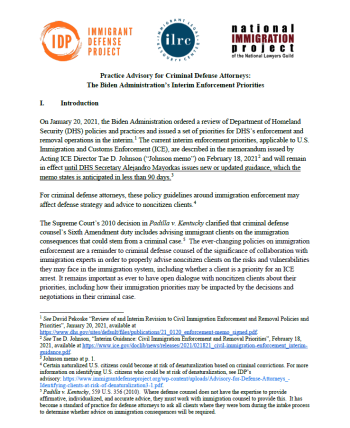
This practice advisory from the ILRC, NIPNLG, and IDP advises criminal defense attorneys on new immigration enforcement policies and how to use the new guidance to defend clients in criminal proceedings.
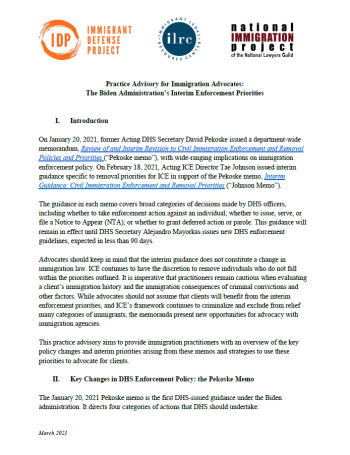
ICE enforcement policies have changed under the Biden administration, and opened new opportunities to defend your clients from arrest, detention, and deportation. This practice advisory from the ILRC, NIPNLG, and IDP provides immigration practitioners with an overview of the interim enforcement priorities and other key policy changes described in recent DHS and ICE memos, and discusses strategies to use these priorities to advocate for prosecutorial discretion.

This resource briefly reviews the February 18, 2021 interim ICE Memo issued by Acting Director Tae Johnson regarding how ICE will carry out DHS enforcement priorities. The new ICE guidance, effective immediately, will remain in effect until DHS Secretary Alejandro Mayorkas issues new DHS enforcement guidelines. This resource covers applicable enforcement actions, a review of the described enforcement priorities, and potential advocacy opportunities.

This resource includes an update regarding the ongoing Gonzalez v. ICE federal litigation. On September 11, 2020, the Ninth Circuit issued a decision which includes some important changes to the February 2020 Central District of California federal court order. We have included an update on the first page which discusses what has changed, followed by information from our April 2020 resource. Please note that some of the information in our April 2020 resource related to the previous district court order is no longer applicable.